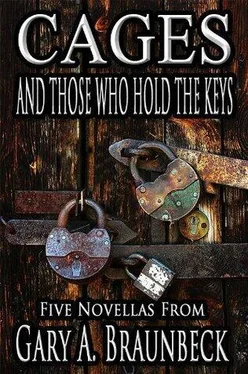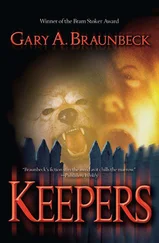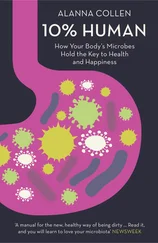Be careful; once you’re inside, Gash will know and he’ll come looking. Make damn sure he doesn’t spot you—and more important than that, make sure you don’t see him. It , actually. Trust me on this: you lay eyes on that thing, you’d sooner rip them out of their sockets than have to look at it a second time.
The exhibit you want is called Rights of Memory. In it, you’ll find a piece entitled As Was, As Is . Smash the case, and take the piece out of the museum. Once you’ve gotten out, destroy it—and don’t let your heart or hand be swayed by its appearance, that’s what Gash wants.
This piece is the disease; it is the physical form of the Alzheimer’s that is killing Bob; Gash is what the Alzheimer’s is becoming. As long as he and it are in the same place, the process can’t be stopped. He’s been using other pieces from inside the museum to build himself; when Bob dies, he will ingest As-Was and be complete. It is the single most powerful source of his strength; destroy it, and he’s toast.
No, this won’t save Bob, but it will stop Gash and buy the rest of the Substruo time to repair the foundation while they wait for Bob’s replacement to come of age.
Then there’s one last thing that you’ll need to do, and it’s going to take nerve.
Here Jerry had drawn an arrow at the bottom of the page. Martin turned over the letter and read the two short lines written there.
“Oh, no . . . .”
From the bed, Bob released another rattle-wheeze-pop! Martin looked at him. The gaps between each breath were growing longer. And Martin knew what this meant; he’d known it with Dad, known with Mom. There was maybe an hour left; probably less.
He grabbed the flashlight from under the bed, rose from the chair, leaned down, kissed Bob’s forehead, whispered, “Good-bye, my friend; I will keep you in my heart always,” then walked across the room, kicked aside the crate, wrenched open the door, and ran. And ran. And ran. Hitting the street, he kept running, the crowbar hanging from his grip, not giving a good goddamn if anyone saw him or not. He would not be stopped. Regardless of what he had to do, he would not be stopped. He stuck to the side streets and alleyways. Six minutes after he’d said good-bye to Bob, Martin emerged half a block from West Church Street. He would have to be out in the open now; if the cops were going to spot him, it would be between here and DeVito’s.
The area of the square where he’d emerged was once again swarming with classic cars . . . and police cruisers. Like the first night, the cars seemed to be going a little too fast, showing off, but the cops seemed to be enjoying it as much as the spectators.
Good, just keep watching the show . . .
Sliding the crowbar back up the sleeve of his coat, he lowered his head and started crossing the street—there were a lot of spectators tonight, the streets were lined with lawn chairs—and was just turning the corner onto West Church when a little boy sitting a few feet away from a foot-patrol officer shouted: “That guy’s all bloody!”
The officer turned in Martin’s direction, saw the way he looked, and began approaching him while simultaneously talking into the microphone of his portable communications unit.
Martin shook his arm, letting the crowbar drop back into his grip.
Only if I have to . . . Then turned and continued walking away. After a few yards, he turned and looked behind him. The officer was at the corner, finishing speaking into his mike, looking right at him. Martin tightened his grip on the crowbar.
And then a grotesquely wonderful thing happened: someone in a souped-up ’67 Chevy hit the gas to beat a yellow light, didn’t make, and broadsided a Bentley that in turn spun around and slammed into the front end of a ’74 Ford Mustang. The collision wasn’t bad enough to seriously injure any of the drivers or passengers, but it created one hell of snarl.
The officer following Martin spun around to see what had happened, then ran out into the street and started directing traffic around and away from the accident.
Martin wasted no time; he sprinted down West Church, crossed at the deserted intersection, and ran to the front of the Tae Kwon Do studio. To the left of the display window
( used to be so many books there )
was a dilapidated-looking puke-green door. Martin put his shoulder against it, worked the curved edge of the crowbar between the door and jamb, and forced it open.
Could have a whole new career as a burglar waiting for you.
He all but threw himself into the small area at the bottom of the stairs, yanking the door closed and whispering a silent hallelujah when it stayed in place.
He took a few seconds to catch his breath— I’m gonna quit smoking I swear to God I’m gonna quit —then realized that by closing the door he’d plunged himself into near-total darkness.
He fumbled the flashlight from his coat pocket and turned it on; the beam came alive with churning dust motes, wriggling a bright path up the two dozen or so stairs that led to the second floor.
Martin began to climb, the stair boards creaking and groaning under his weight. He seemed to be making a habit of climbing up noisy stairs.
Halfway up, something scuttled away from the wide beam of light.
God I hope it’s not some wino waking up from a binge.
Then: Or Gash testing the exit once again. He stood shivering in the silence, listening for the sound of any further movement. Nothing. He ascended the rest of the stairs without incident. He reached the landing of the second floor and turned left into a long corridor, stopping at the first door. It opened with a low, deep moan, loosing a cloud of dust.
Martin swung the flashlight beam around the room, illuminating an old sofa, its springs and stuffing bursting forth and spilling to the floor, crawling with insects. The room was littered with old newspapers, broken boards, and pieces of shattered glass. The walls glistened from both the broken pipes behind them and the leaking roof; the wallpaper curled downward like strips of flayed skin, and much of the plaster had fallen out in large chunks to reveal the disintegrating plumbing and electrical wiring that ran in sloppy, tangled patterns.
The largest of the windows in this room was broken, sections of sharp glass jutting upward like crooked teeth. A steady, chill October wind whistled softly through, ruffling sections of newspaper that drifted along the floor with dry, rasping sounds before pressing against the wall, torn corners rustling like the wings of a moth. Martin cast the flashlight beam down onto the floor and saw the desiccated corpses of several flies and beetles buried under layers of dust and grime.
He entered, the flies and beetles crunching under his shoes. Somewhere in a back room, water was dripping steadily, pinging against metal. He caught his foot on a large piece of cardboard, kicking it aside to reveal a nest of spiders.
Sidestepping the nest, he moved toward the nearest door—what he assumed to be the bedroom. A mildew-stained mattress lay on the floor in the corner, a third of its surface burned away some time ago by a careless cigarette; the stink of the old fire still lingered in the air.
He looked through the room for the painting and, not finding it or anything that might be a key, moved to the only other room, deciding the kitchen was right out and not wanting to risk seeing the condition of the bathroom.
At first he thought he’d struck out here, as well; nothing but more newspapers, cardboard boxes stuffed with old magazines and painting supplies, and more broken glass. He shone the flashlight on the walls to his left and right, then the one in front of him.
Читать дальше












